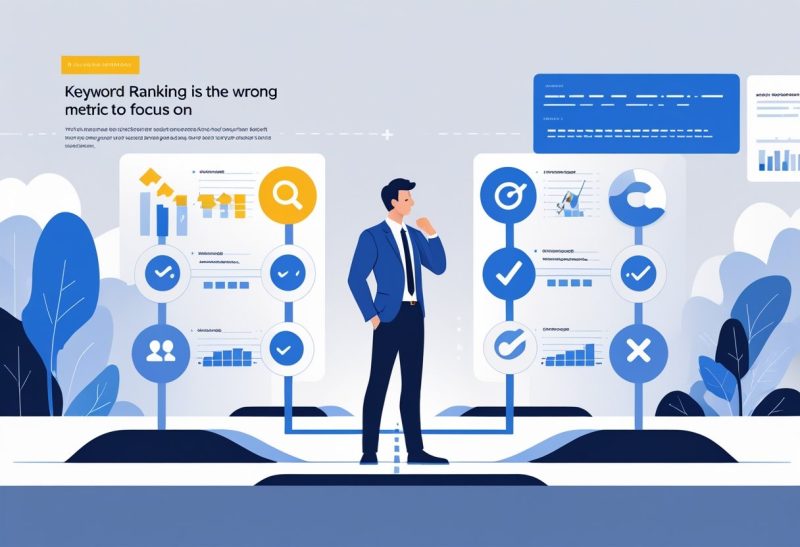When evaluating your SEO strategy, focusing on keyword ranking can be misleading. The true value of your SEO efforts lies in metrics that directly impact your business, such as organic traffic, conversions, and user engagement. Relying solely on rankings can create a false sense of security and lead you to overlook more crucial aspects of your online presence.
Using tools like Serpple allows you to monitor keyword rankings efficiently and at a lower cost than many premium options. However, it’s essential to understand that while tracking these rankings is important, they should not dominate your focus. Shifting your attention to overall performance metrics can drive better results and provide a clearer picture of your SEO success.
You might find that focusing exclusively on keywords limits your ability to adapt and respond to changing user behavior and market trends. Emphasizing metrics that contribute to actual business growth will propel you toward achieving your goals and enhancing your online visibility.
Understanding Keyword Ranking as a Metric
Keyword ranking serves as a fundamental aspect of SEO, influencing how businesses gauge their visibility online. It reflects the position your website occupies for specific keywords in search engine results. This section clarifies the definition of keyword ranking and discusses its historical significance in the realm of SEO.
Definition of Keyword Ranking
Keyword ranking refers to the position a webpage holds in search engine results pages (SERPs) for targeted keywords. For instance, if your website is ranked first for “best running shoes,” it appears at the top of search results when users search that term.
Monitoring keyword rankings is crucial for assessing SEO performance. Tools like Serpple allow you to track these rankings efficiently, making it easier to manage multiple clients without incurring high costs associated with premium tools.
It’s essential to understand that a high keyword rank can lead to increased organic traffic, as users tend to click on top results. However, focusing solely on rankings does not account for the quality of traffic or conversion rates, which are critical for long-term success.
Historical Importance in SEO
In the early days of SEO, keyword rankings played a pivotal role in determining a website’s success. Marketers prioritized climbing SERPs, often primarily focusing on the quantity of keywords rather than their relevance.
Over time, search engines evolved, placing increased emphasis on user experience, content quality, and engagement metrics. Despite its historical significance, relying heavily on keyword rankings can lead to vanity metrics, where you may rank well but attract non-converting traffic.
Today, keyword rankings still hold importance, but they must be considered alongside other metrics such as click-through rates and conversion rates. This shift reflects a broader understanding of SEO, where comprehensive keyword research and strategic content development are vital for sustained online visibility.
Limitations of Focusing Solely on Keyword Ranking
Focusing on keyword ranking can mislead your SEO strategy, presenting an incomplete picture of your website’s performance. Additionally, this approach often ignores the crucial element of search intent, which plays a vital role in attracting quality traffic.
Misleading Indicators of Success
Relying solely on keyword rankings can create an illusion of success. A high rank for a keyword may not translate into meaningful traffic or conversions. For instance, keywords with high search volume can attract visitors who aren’t ready to engage with your product or service.
Google often prioritizes user experience in its search engine results pages (SERPs). Metrics like click-through rate and engagement levels provide a more accurate assessment of your content’s effectiveness. Keyword density is another factor; overemphasizing specific keywords can lead to keyword stuffing. This may result in penalties from search engines, further distorting your perceived success.
Ignoring Search Intent
Another significant limitation of focusing on keyword ranking is the neglect of search intent. Users enter queries with specific needs; therefore, understanding these needs is essential for effective SEO.
For example, terms may vary in intent: informational, navigational, and transactional keywords all serve different purposes. A keyword may rank well, but if it doesn’t match user intent, it won’t drive the right traffic. Crafting compelling meta descriptions that align with search intent can enhance your visibility in SERPs. Consequently, aligning your content strategy with user intent ensures your efforts yield the desired results, fostering long-term engagement rather than fleeting clicks.
Why Alternative SEO Metrics Matter More
Focusing solely on keyword ranking can lead to a narrow view of your website’s performance. Instead, by examining alternative metrics, you can gain a more comprehensive understanding of your SEO efforts. Tools like Serpple allow you to manage multiple clients effectively while providing affordable tracking solutions for your SEO metrics.
Organic Traffic and Conversions
Organic traffic is a direct reflection of your website’s effectiveness in attracting visitors from search engines. This metric is crucial because it indicates how well your content resonates with your target audience. High organic traffic can lead to increased conversions, which measure desired actions taken by visitors, such as signing up for a newsletter or completing a purchase.
You should analyze both metrics together. If your organic traffic is high, but conversions are low, it signals a need for improved user experience on your site. Understanding these dynamics allows you to tailor your strategies, enhancing both traffic and conversion rates over time.
Measuring Visibility and Authority
Website visibility encompasses how prominently your site appears in search engine results pages (SERPs) for relevant queries. Instead of just aiming for a high keyword ranking, you should assess your overall visibility to ensure your content is discoverable by users.
Authority is another essential metric that establishes your website’s credibility. Search engines rank sites with higher authority more favorably. You can build authority through quality backlinks, engaging content, and consistent publication. Monitoring these aspects will provide a clearer picture of your site’s ability to attract organic traffic and achieve meaningful user engagement.
The Impact of Context and Competition
Understanding context and competition is essential when evaluating keyword rankings. Focusing solely on ranking positions for specific terms might lead you to overlook critical dynamics that affect your SEO performance. Tools like Serpple can provide comprehensive tracking of keyword performance, allowing you to monitor these factors effectively and affordably.
Search Volume Versus Search Terms
Search volume refers to the number of times a keyword is searched within a specific period, but this metric alone does not dictate success. It’s imperative to consider the relevance of search terms used by your audience. For example, a keyword with high search volume may not translate to conversions if it does not align with user intent.
Incorporating long-tail keywords can often yield more qualified traffic, as they capture specific queries. Additionally, understanding the context surrounding your target audience’s searches can enhance your content strategy. Always analyze both the search volume and the specific terms to identify opportunities that may be overlooked.
Competitive Analysis and Ranking Factors
To grasp the potential of your keywords, you must conduct a competitive analysis. This includes researching your competitors’ rankings, their use of keywords, and their content strategies. You will find that competition greatly influences your ability to rank. High competition keywords might lead to minimal visibility, while less competitive terms can open new avenues for traffic.
Various ranking factors, such as domain authority, page speed, and user engagement, play significant roles in keyword effectiveness. Therefore, recognizing the competition and these factors allows you to create more targeted and effective SEO strategies. Use tools like Serpple to understand how your competitors are performing and adjust your approach accordingly.
Strategic SEO Approaches Beyond Keyword Ranking
To create a robust SEO strategy, it’s essential to look beyond traditional keyword rankings. An effective approach combines a holistic content strategy with measures to minimize issues like keyword cannibalization. Utilizing tools such as Serpple can assist you in tracking various metrics that truly reflect your site’s performance.
Holistic Content Strategy
A holistic content strategy involves creating valuable, high-quality content that addresses user intent rather than simply targeting keywords. Focus on understanding your audience’s needs and crafting content that answers their questions or solves their problems.
Incorporate different content formats, such as videos, infographics, and articles, to enhance engagement. This strategy not only improves user experience but also increases the likelihood of backlinks. Backlinks are critical for boosting authority in Google’s search algorithm.
Utilize data-driven insights to inform your content planning. Analyze top-performing pages and identify gaps in your existing content. Tools like Serpple can help you track what content resonates best with your audience.
Reducing Keyword Cannibalization
Keyword cannibalization occurs when multiple pages on your site compete for the same keyword, negatively impacting your SEO. To address this issue, conduct a thorough audit of your content to identify overlapping keywords.
Once identified, either merge similar content into a single, authoritative page or optimize each page for distinct keywords. This clarity allows search engines like Google to index your pages correctly and enhances their chances of ranking higher.
Moreover, implementing internal linking strategies can reinforce the relevance of your primary page, guiding both users and search engines. By reducing keyword cannibalization, you improve your overall site structure and ensure that each piece of content serves its intended purpose effectively.
Tools and Techniques for Effective SEO Measurement
To accurately assess your SEO performance, it’s essential to utilize various tools and techniques. By incorporating analytics platforms and rank trackers, you can gain insight into your website’s strengths and weaknesses. Tools like Serpple provide an affordable solution for managing keyword rankings efficiently across multiple clients.
Leveraging Analytics Platforms
Analytics platforms like Google Analytics and Search Console offer you valuable data on user behavior and website performance. You can monitor metrics such as organic traffic, bounce rate, and user engagement trends.
These platforms also allow you to analyze which keywords are driving traffic. This information helps you prioritize your SEO strategies effectively. By focusing on high-value keywords, you can align your content with user intent.
Using such data, you can make informed decisions rather than relying solely on keyword rankings as a metric. It’s essential to track user interactions to understand the effectiveness of your SEO efforts better.
Role of Rank Trackers
Rank trackers are essential for monitoring your keyword positions in search engine results pages (SERPs). They give you a clear picture of how your targeted keywords perform over time. Tools like Serpple stand out due to their cost-effectiveness and user-friendly interface.
With rank trackers, you can observe fluctuations in rankings and identify patterns that may require adjustments in your strategy. Keeping tabs on keyword performance helps you stay proactive rather than reactive.
High-quality rank trackers also offer insights into your competitors’ rankings, helping you fine-tune your own SEO approach. By diversifying your measurement techniques, you ensure a more holistic view of your SEO success.
Frequently Asked Questions
Keyword rankings can sometimes give a narrow view of your SEO efforts. It is essential to explore a range of metrics that provide deeper insights into your site’s performance. Using tools like Serpple can help you track these metrics efficiently without incurring high costs.
What metrics are more indicative of SEO success than keyword rankings?
Metrics such as organic traffic, conversion rates, and user engagement tend to reflect the overall effectiveness of your SEO strategies more accurately. Organic traffic indicates how many users are visiting your site through search engines. Conversion rates demonstrate how well you turn visitors into customers.
How can focusing solely on keyword rankings be misleading for overall SEO performance?
Solely focusing on keyword rankings might lead you to ignore significant trends in user behavior and market demands. A high ranking for a keyword does not guarantee increased traffic or conversions if the search intent does not align with your offering.
What are the limitations of using keyword rankings as the sole metric for SEO success?
Using keyword rankings alone fails to consider aspects like user experience, site speed, and mobile-friendliness. These factors significantly affect your site’s performance and ranking over time. Relying on just one metric can create a skewed perception of your SEO effectiveness.
How do fluctuations in keyword rankings impact the perception of SEO performance?
Fluctuations in keyword rankings can create a false sense of urgency or failure. A drop might indicate a temporary change rather than a long-term trend. You may overlook underlying issues affecting user engagement and traffic.
What alternative metrics should be considered alongside keyword rankings to fully assess SEO effectiveness?
It’s crucial to consider metrics like bounce rate, time spent on the site, and click-through rates. These provide a more comprehensive understanding of user interaction with your content. Assessing these alongside rankings can help you see the bigger picture.
Why is it important to look beyond keyword rankings when measuring the success of SEO strategies?
Focusing solely on keyword rankings can inhibit your growth. You may miss opportunities to optimize content for user intent and experience. Evaluating a wider range of metrics leads to a more effective SEO strategy that aligns with your business objectives.


